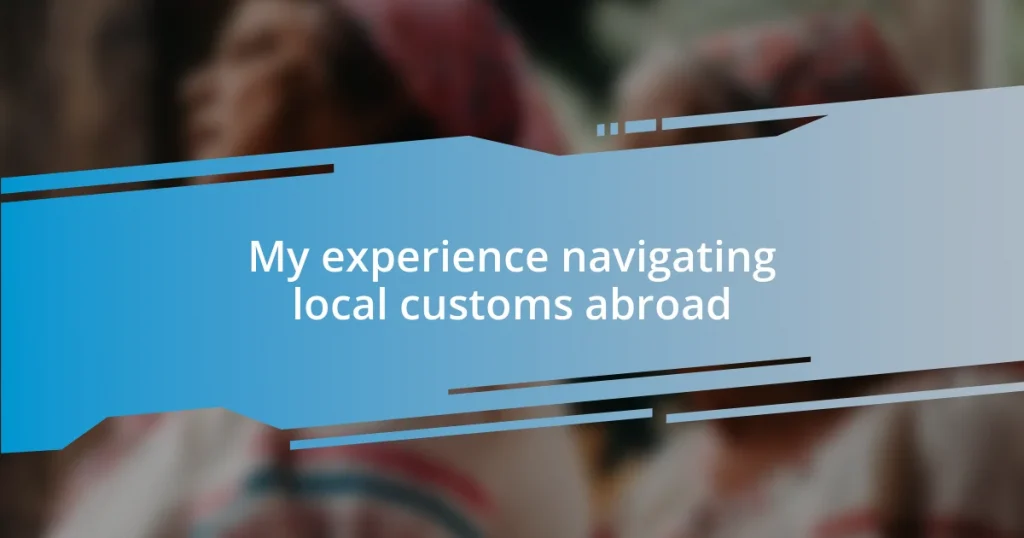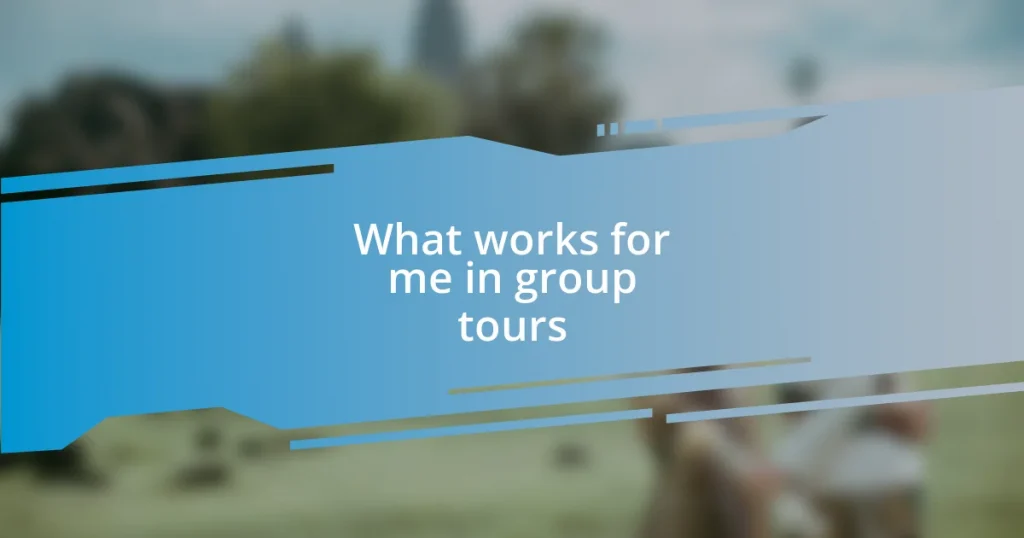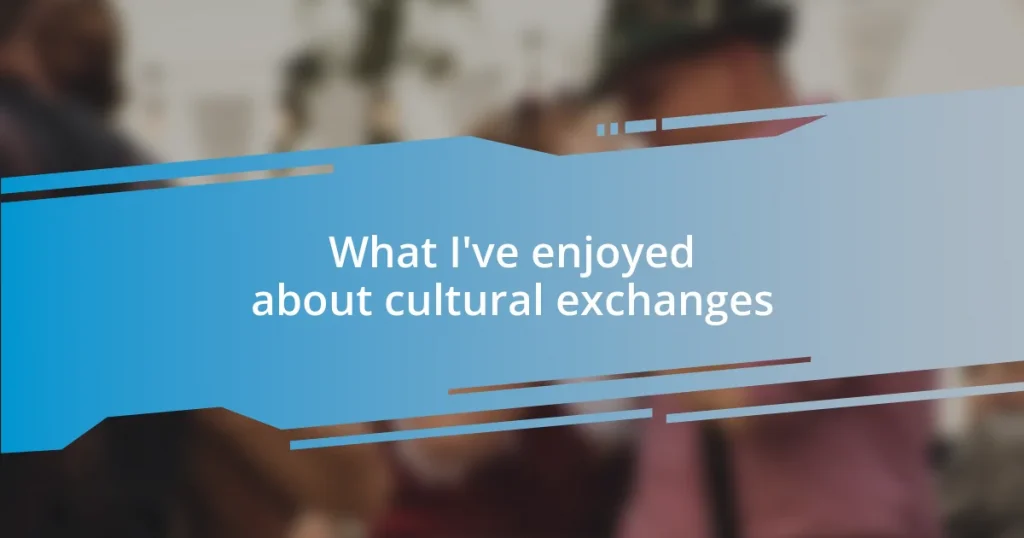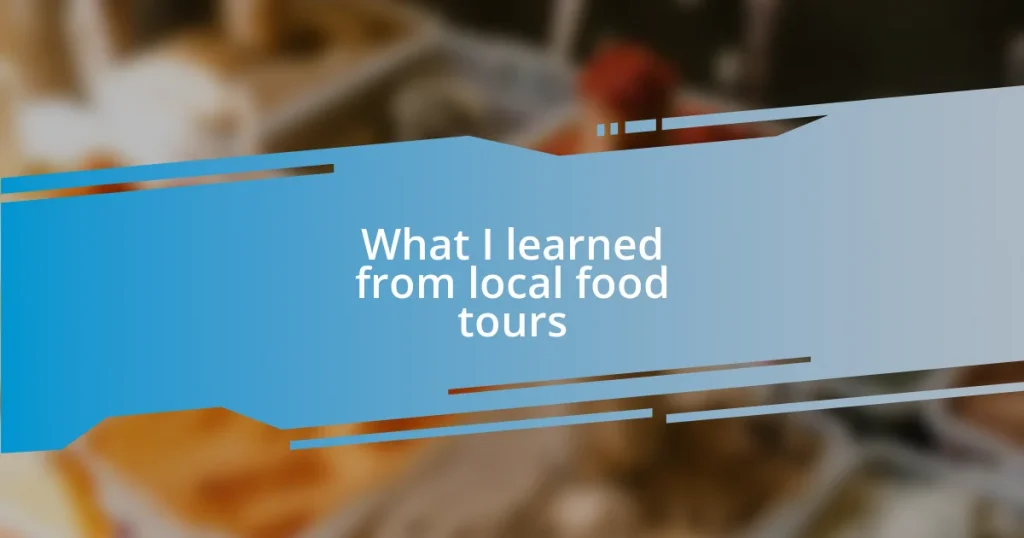Key takeaways:
- Understanding and respecting local customs, such as greetings and dining practices, fosters deeper connections and mutual respect while traveling.
- Adapting to local communication styles and being open to learning from mistakes can lead to enriching experiences and stronger relationships with locals.
- Engaging in local activities and embracing differences encourages personal growth and cultural understanding, turning challenges into opportunities for connection.
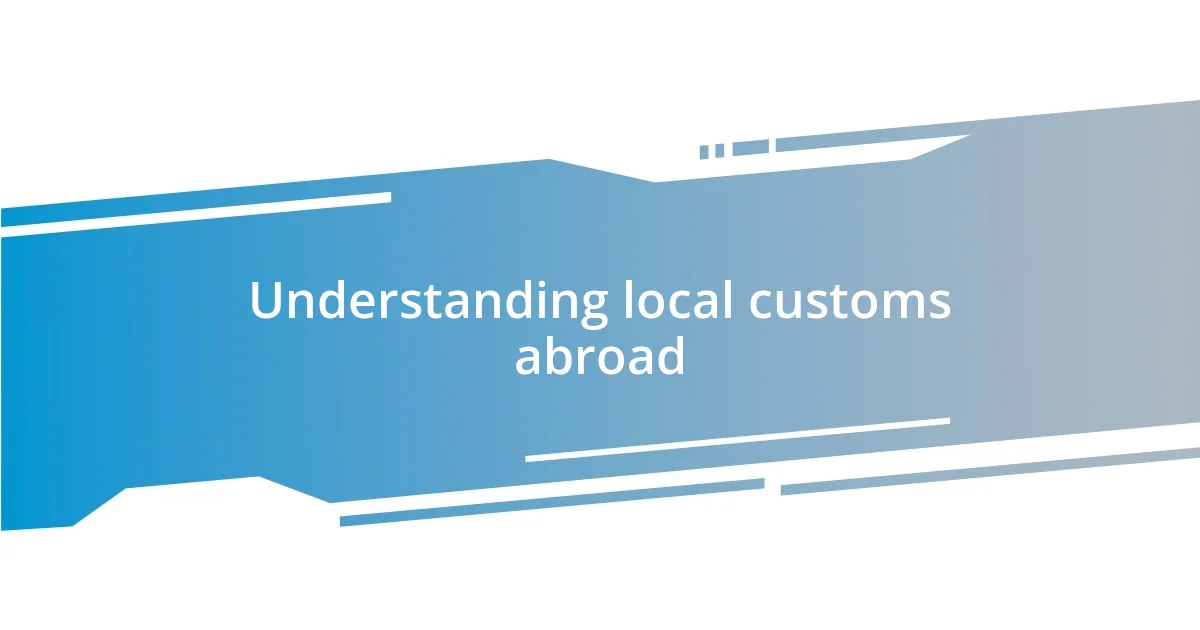
Understanding local customs abroad
When I first traveled to Japan, I was struck by the depth of the cultural nuances surrounding greetings. Bowing felt foreign to me, and I remember nervously mimicking the locals, wondering if I was doing it right. Have you ever experienced that moment when you realize you might unintentionally offend someone simply by not understanding their customs?
Food is another fascinating area where local customs come alive. During my trip to Morocco, I learned that sharing a meal is sacred. I remember sitting on the floor with a group of locals, passing a Tagine around and realizing how vital this act of dining together was. Isn’t it incredible how food can bridge cultural divides while expressing warmth and community?
In my experience, body language can vary dramatically across cultures, often conveying respect or familiarity. I once saw a friend’s expression change when he put his arm around a local in South America, unknowingly crossing an invisible line of personal space. This taught me that being mindful of such subtleties not only enriches travel but fosters genuine connections. How do you express openness without overstepping boundaries?
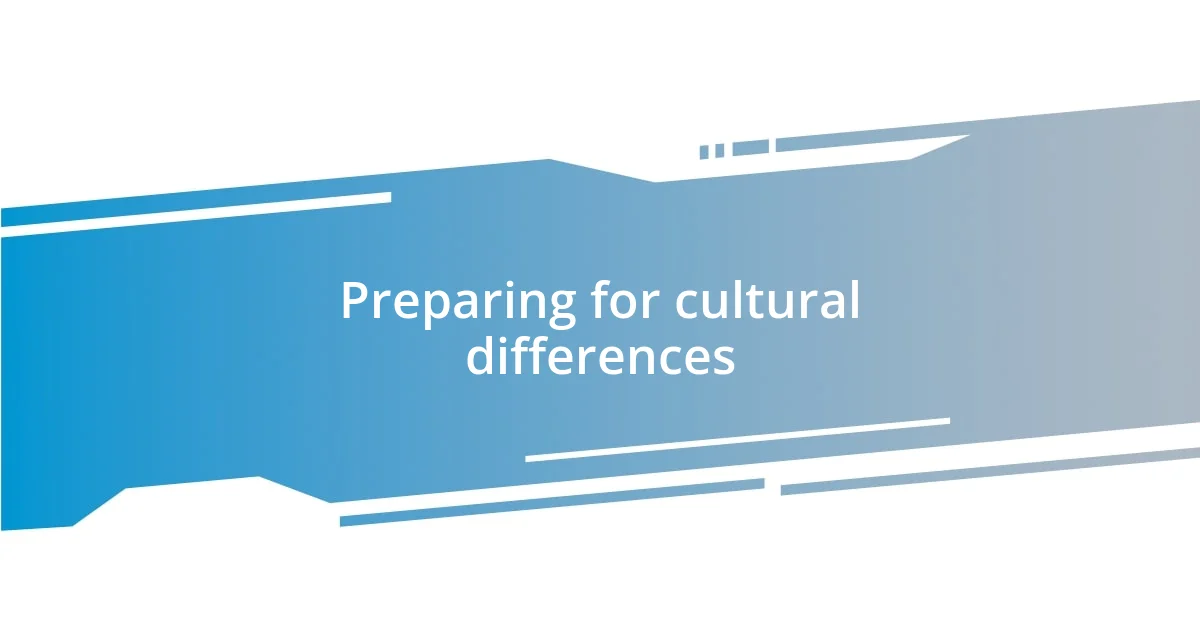
Preparing for cultural differences
Preparing for cultural differences is crucial for any traveler. Before heading to Thailand for the first time, I immersed myself in understanding the local customs. I remember watching videos on the proper ways to greet someone with a “wai” (a traditional Thai greeting) and how important it is to remove shoes before entering homes. These small details made a significant impact on how warmly I was received upon arrival.
Here are a few practical steps I took to prepare for cultural differences:
- Research local customs: Understand greetings, dining etiquette, and dress codes.
- Practice key phrases: Learning a few words in the local language can bridge gaps and show respect.
- Connect with locals: Social media can be a great tool to reach out to people in the area for firsthand advice.
- Be mindful of body language: Understand what gestures are acceptable and which ones might offend.
- Stay open-minded: Embrace differences and be ready to adapt your mindset and behavior.
These strategies not only eased my transitions into new cultures but also helped me connect deeply with the people I encountered. Each encounter was a learning experience, highlighting just how diverse our world truly is.
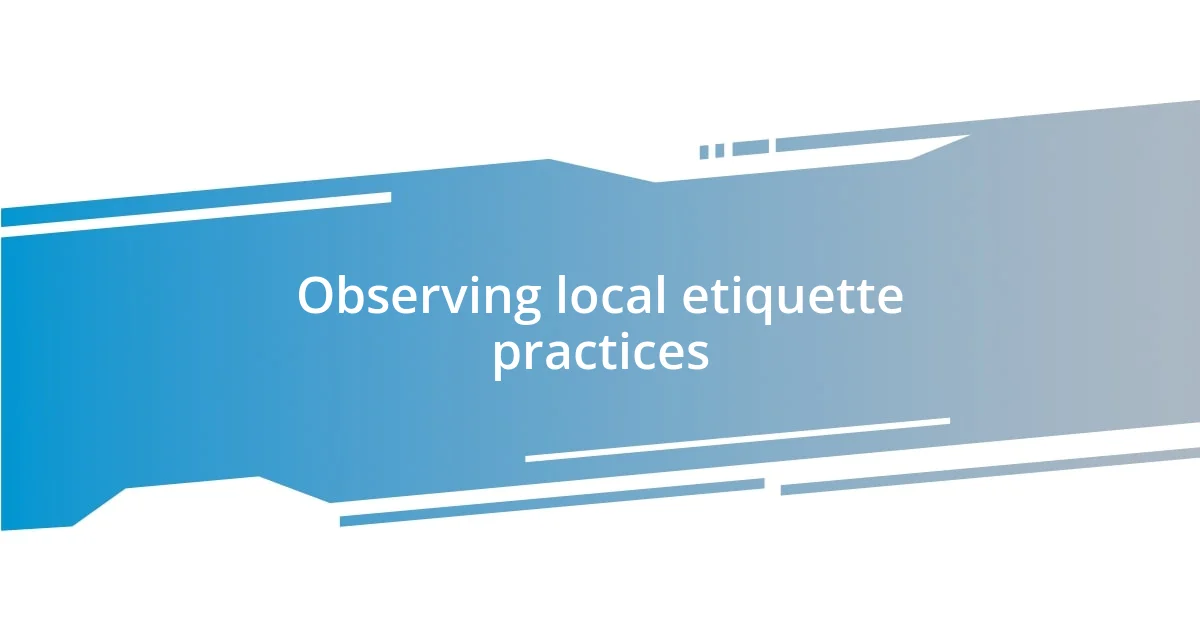
Observing local etiquette practices
When I traveled to India, I quickly learned the importance of removing shoes before entering homes. One time, I walked into a friend’s house without taking mine off and immediately felt a wave of embarrassment wash over me. The looks on their faces showed me that this was a deeply rooted cultural norm—a sign of respect that I had overlooked. Have you ever experienced a feeling like that, where a simple act could speak volumes about your understanding of local customs?
In my time in Italy, gestures became another area of learning. I remember communicating with a local vendor using hand signals, only to realize later that I had accidentally waved goodbye instead of asking for directions! The laughter that followed helped me connect with the vendor, but it also highlighted the nuances of body language across cultures. It made me think: how often do we assume we understand before truly paying attention to the details?
I find that observing etiquette practices allows you to connect on a deeper level with local communities. During my trip to Kenya, I joined a traditional Maasai dance circle, where I felt the rhythm of their culture through music and movement. Participating in this experience created an unspoken bond between us, allowing me to appreciate their values beyond words. Have you tried engaging in local customs that turned into heartfelt moments?
| Country | Etiquette Practice |
|---|---|
| Japan | Bowing as a greeting |
| Morocco | Sharing meals, often from a communal dish |
| Thailand | Wai greeting and removing shoes |
| Italy | Gesturing while speaking, with attention to cultural meanings |
| Kenya | Participating in traditional dance as a sign of respect |
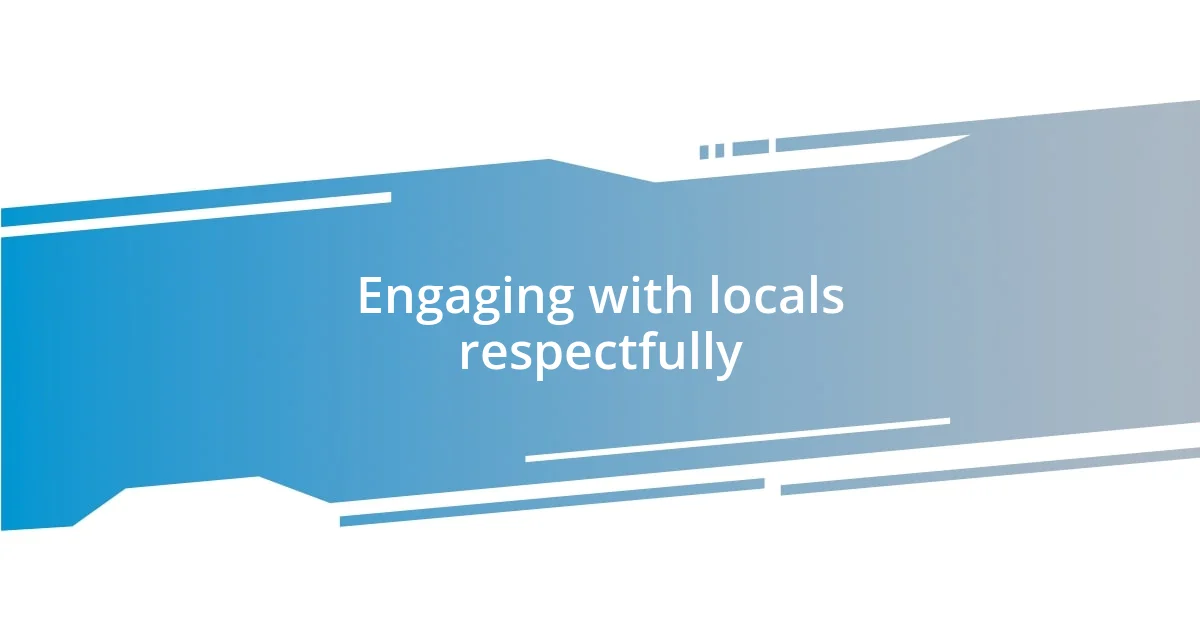
Engaging with locals respectfully
Engaging respectfully with locals can truly transform your travel experience. I remember a moment in Japan when I decided to attend a tea ceremony. As I entered the serene space, I instinctively bowed, mimicking the host’s movements. The instant smile exchanged between us was a beautiful reminder of how mutual respect resonates across cultures. Have you ever felt that connection blossom just from a simple gesture?
While in Brazil, I was fortunate enough to be invited to a family gathering. I learned that arriving punctually was considered rude; instead, they embraced the “Brazilian time” philosophy. This approach made me realize how cultural perspectives on time can differ so widely. It reminded me that intent and understanding often hold more weight than rigid rules, fostering a warmer atmosphere. Can you recall a time when you adapted to local customs, finding joy in the unexpected?
Another memorable experience was in Ghana, where I was welcomed into a vibrant market. Initially, I hesitated to interact, afraid of imposing on their space. However, a vendor cheerfully beckoned me over, and I found myself learning the art of bargaining. The laughter we shared over miscommunications turned what could have been a daunting exchange into a delightful connection. Reflecting on that moment, it dawned on me that the willingness to participate respectfully opens doors to friendships and deeper understanding. How have your interactions led to unanticipated connections during your travels?
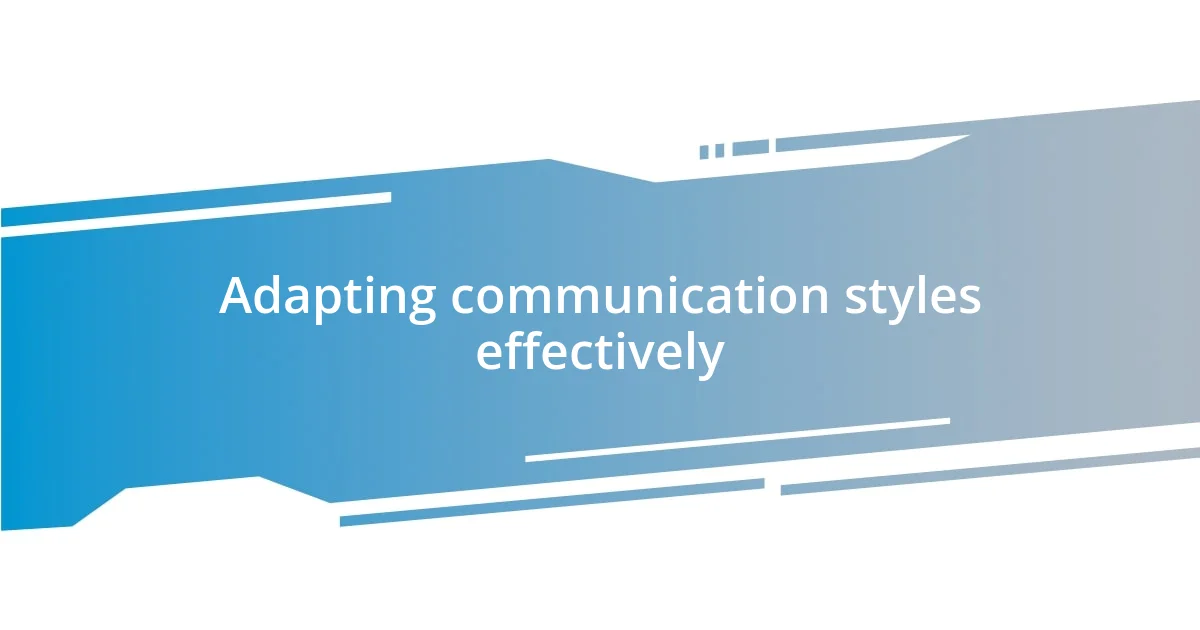
Adapting communication styles effectively
Adapting to different communication styles can be a fascinating journey. I’ve found that in some cultures, indirect communication is key. For instance, while visiting Thailand, I noticed that my friends often used subtle cues rather than direct statements to express disagreement. At first, it confused me, but as I paid closer attention, I understood how their approach preserved harmony. Have you ever struggled to catch on to non-verbal hints that reveal deeper sentiments?
During a conversation in Germany, I learned the value of being direct in my communication. I remember discussing travel plans, and my friends were refreshingly straightforward about their preferences. This openness not only made the planning process smoother but taught me that clarity can enhance relationships. I felt relieved to avoid misunderstandings—how much more efficient our interactions became when we embraced honesty and transparency!
I also recall my interactions in Egypt, where I was startled by the robust warmth in greetings. People often greeted each other with inquiries about their families before discussing business. This emphasis on personal connection made me reconsider how often I jump straight into the topic at hand. It led me to wonder: how could a little more warmth and personalization in our everyday conversations bridge gaps and foster deeper relationships?
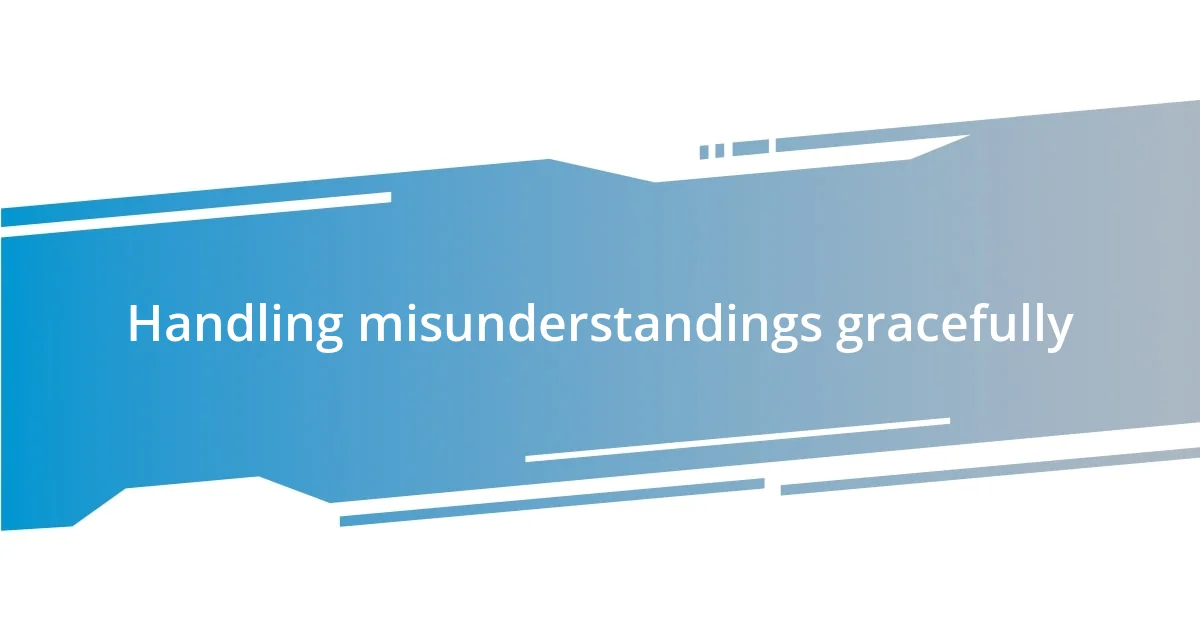
Handling misunderstandings gracefully
Navigating misunderstandings abroad can be a delicate dance, but handling them gracefully can turn what could be an awkward moment into a meaningful exchange. I remember a time in Italy when I mistakenly used familiar language with a shopkeeper, thinking I was being friendly. Instead of taking offense, he chuckled and gently corrected my approach, showing me the importance of maintaining formality in that context. Have you encountered a situation where a graceful correction helped avoid potential embarrassment?
In Morocco, I once mispronounced a word while trying to engage in a conversation with locals. Instead of laughing or dismissing me, they warmly encouraged my efforts with smiles and gentle laughter. This experience taught me that embracing mistakes can often create a lighter atmosphere, leaving room for understanding. It’s incredible how a little kindness can bridge the gap when things get tricky—how do you feel when someone acknowledges your attempt to communicate in their language?
During one of my travels to Spain, I found myself lost in translation while ordering food. The waiter sensed my frustration and instead of rushing me, he patiently guided me through the menu with enthusiasm. That encounter left me with a sense of relief, as I realized that those who understand local customs often appreciate our efforts, even if we stumble. Think about a time when someone went out of their way to assist you, transforming a potential misunderstanding into a cherished memory.
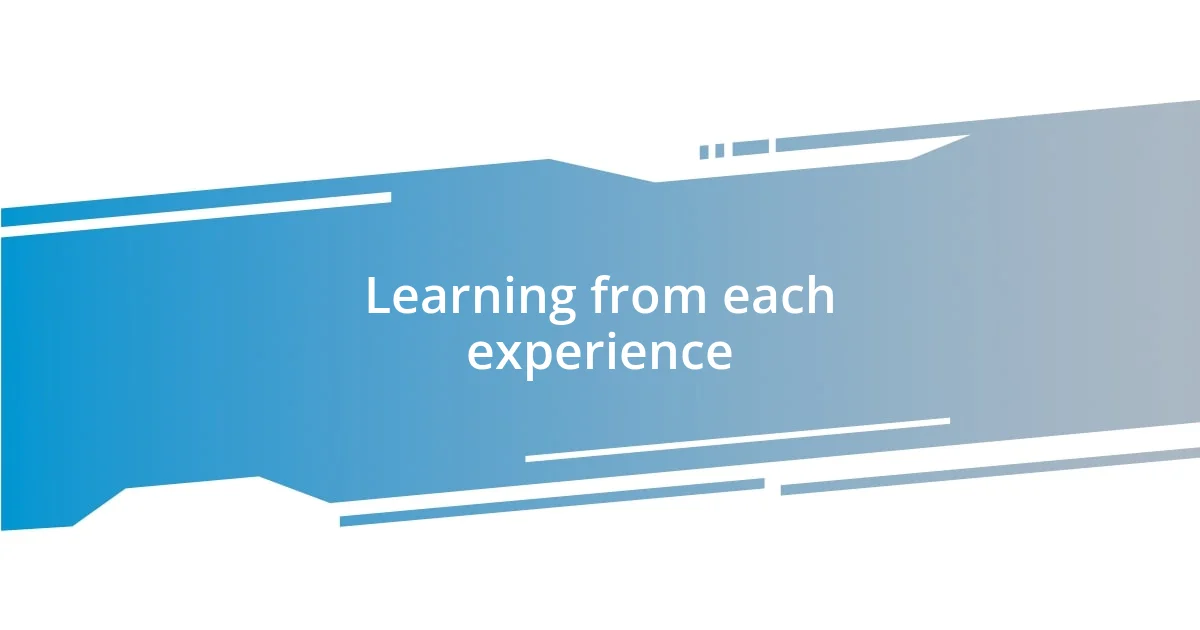
Learning from each experience
Learning from each experience involves reflecting on the moments that challenge us. I vividly remember my first encounter with chopsticks while dining with a host family in Japan. Struggling to lift my food, I fumbled and dropped a piece of sushi, feeling embarrassed. But my hosts smiled warmly, and instead of making me feel out of place, they shared tips on using chopsticks. This taught me that making mistakes can lead to valuable lessons and stronger bonds. Have you ever realized that a simple blunder opened doors to deeper understanding?
In another instance, while exploring the bustling markets of India, I was overwhelmed by the chaos and vibrant energy. When I tried to haggle, I misjudged the price and raised my voice, thinking it would help me negotiate. The vendor, however, simply laughed and said, “We’re friends here, no need to shout!” That awkward moment shifted my perspective completely. I learned that building rapport is far more effective than relying solely on negotiation tactics. How often do we forget that a friendly connection can make a world of difference in any exchange?
Each of these experiences reinforced the idea that every misstep is an opportunity to grow. After a confusing conversation in Brazil, where I misunderstood cultural references, I took the time to ask about their significance. The laughter that followed was contagious, and suddenly, I was part of an ongoing story about their culture. It made me realize that curiosity is a bridge to understanding and meaningful connection. Have you ever found that asking questions turned a confusing moment into a delightful learning experience?











